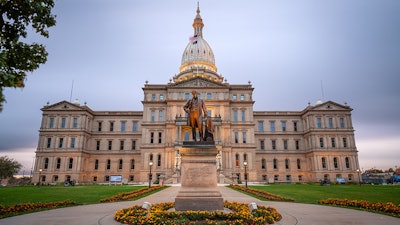
Michigan Gov. Gretchen Whitmer signed a two-bill package into law Oct. 19 that will allow tribal cannabis businesses to participate in Michigan’s regulated cannabis market.
The pair of bills, Senate Bill 179 and Senate Bill 180, passed the Legislature earlier this month. The legislation allows Michigan to enter into compacts with the state’s sovereign tribes regarding cannabis regulation and taxation.
The bills authorize tribal cannabis operations to buy and sell products within the state’s regulated market as long as the tribal businesses levy Michigan’s 10% excise tax on the sales. The legislation also allows tribes to qualify for distributions from Michigan’s Marihuana Regulation Fund at the same rate as local governments; the fund pays out 15% of its unused balance each year to counties and municipalities based on the number of cannabis retailers and microbusinesses they host.
Sen. Jeff Irwin, D-Ann Arbor, sponsored S.B. 179 and said the legislation would eliminate barriers between the state and its tribal communities, as well as create an equitable system for state-licensed and tribal cannabis businesses to transact with each other, according to a Crain’s Grand Rapids Business report.
“We’d no longer have two silos but one system for the trade in cannabis here in Michigan,” he said during a Regulatory Reform Committee hearing on the bills, according to the news outlet.
Whitney Gravelle, president of the Bay Mills Indian Community, said during her testimony on the legislative package that the cannabis compacts allowed under the legislation will “finally allow tribally owned businesses access to the state recreational marijuana economy and access to the Marijuana Enforcement Tracking and Compliance system, both of which tribal nations have been unable to participate in since marijuana was first legalized in the state of Michigan,” according to Crain’s.
Based in Brimley, Bay Mills Indian Community was the first tribe to legalize adult-use cannabis in Michigan and the first to open a commercial grow and a dispensary on its reservation, Crain’s reported.
“Presently, Bay Mills Indian Community licenses and regulates our marijuana activity within the jurisdiction of our tribal nation, but we are unable to share that information with the state, nor does the state share any information with Bay Mills,” Gravelle said, according to the news outlet. “This means that when there’s a product issue or a product recall, we are not part of that product recall within the METRC system, and we only find out through public notice. And we are not able to share any information that we may have with the state of Michigan regarding our product.”
Gravelle urged legislative leaders to approve S.B. 179 and S.B. 180, praising the bills as necessary “to be able to protect public health and welfare” for both the state and its tribal communities, Crain’s reported.
The Grand Traverse Band of Ottawa and Chippewa Indians, the Saginaw Chippewa Indian Tribe of Michigan, the Michigan Cannabis Industry Association, Marshall-based cannabis operator Common Citizen, and Michigan’s Cannabis Regulatory Agency all demonstrated support for the legislation leading up to its passage in the Legislature.
The pair of bills took effect immediately with Whitmer’s signature.

























